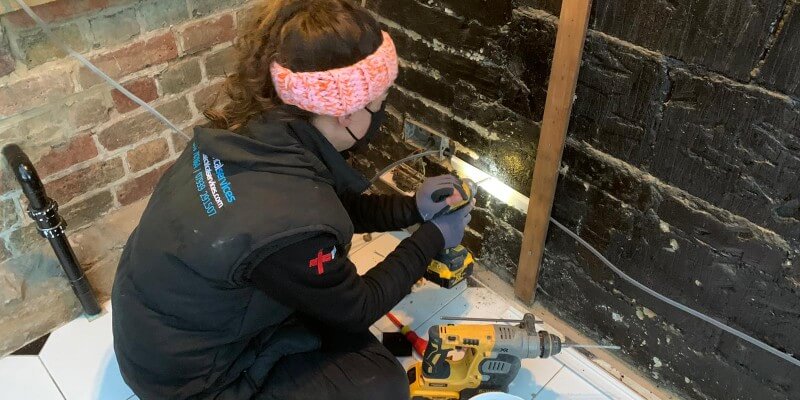Whether you are moving into a new home or have lived in your property for many years, the safety of your electrics should remain a priority. Wiring, in particular, has the most potential to cause hazards should it be left to deteriorate, which is why it is highly recommended to test electrics every five years and consider rewiring every 25 to 30 years.
Although the advised timeframe for rewiring a house is not as frequent as many assume, there are many signs that you should look into rewiring sooner to keep your home safe; this is particularly common for those who are moving into an older home. Having spent many years as electricians in Milton Keynes, we regularly advise clients on the condition of their wiring and whether they need to rewire their house, so we have put together a guide to run through the factors you should keep in mind.
Rewiring a house explained
The wiring of your home is a complex system that runs inside walls and under floorboards. It is responsible for powering the whole electrical installation, appliances, lighting and equipment, meaning that when you have an issue with your wiring, you will most definitely notice that a problem is brewing. Failing to replace deteriorating wiring creates serious fire hazards in your home, so it should never be an issue that is ignored.
If you believe that your home may need rewiring, the best route is always to contact a professional as only trained electricians with the relevant certifications that can carry out jobs of this nature. Our reputable team are always happy to visit your home to conduct assessments of your wiring; however, in the meantime, we recommend familiarising yourself with the following:
- Benefits of rewiring a house
- The process of rewiring a house
- Common questions about home electrical wiring

Benefits of rewiring a house
Although safety should always be your number one priority, there are many other benefits of rewiring a house, which does make this project a worthwhile investment. These advantages include the following:
Adds value to your property
The value of your home can be significantly increased, in many cases by thousands, if it has been signed off by an inspector, making it more appealing to potential buyers. Old electrical systems and wiring can be an instant off-putting factor, particularly if they are beginning to show signs of wear and tear. By opting for rewiring your home ahead of putting it up for sale, you will be giving the new homeowners one less expense to worry about, making it more likely that you will get your asking price. For more handy tips on how to increase property value, take a look at Homebuilding & Renovating.
Save money on your bills
When faced with faulty wiring, one issue that you may not have considered is how it could be impacting your electricity bills. Problematic wiring is known for “leaking” electricity, which means that more power than you need is being forced out of the outlet. This inevitably is going to waste a considerable amount of electricity, meaning that you begin to pay for the power that you have not necessarily used. OVO Energy has put together more information on how you can save electricity at home.

Reduce the chance of losing power
There is nothing more frustrating than unexpectedly losing power, particularly if you are one of the many who have been working from home over the past year or so. Although these issues can typically be resolved quickly, it doesn’t stop them from being a pain.
Electrical surges can be caused by a number of different things, including lightning strikes and power line damage. However, the most frequent cause of power loss is due to faulty electrical wiring. Faulty wiring can not only cause the home to overload with electricity and shut down, but in some cases, your wiring simply cannot produce enough power to run your home due to problems in the system. Either way, by scheduling rewiring when you notice an increase in power cuts, you can prevent being left with a blackout!
Prevent appliances from malfunctioning
Faulty electrical wiring throughout your property can even begin to take its toll on your appliances. As a homeowner, keeping your appliances in full working order is often key in being able to carry out daily tasks. However, when left, deteriorating electrical wiring can cause immense damage to these amenities, resulting in hundreds of pounds in repairs and replacements. Faulty wiring will make it trickier for electricity to evenly distribute across the appliances that require power, potentially resulting in an overload.
Keeps your property compliant with the latest regulations
It is essential for all homeowners to ensure that their property remains in line with the most up to date building regulations but even more so landlords. Landlords are responsible for reassuring the safety of the property they are leasing and have a duty of care to their tenants. These regulations outline exactly what precautions must be taken to meet these standards. The most recent regulation regarding wiring is the British Standard 7671; full details regarding this can be found on the RS Components website.

The process of rewiring a house
Rewiring a house is rarely a quick and easy job, so it is vital to understand what to expect from the process before going ahead. One major factor to consider is that while it is possible to stay in your home during rewiring, there will be mess and disruption. For this reason, particularly if you are rewiring your new house before moving in, it may be easier to postpone your move-in date until after the rewiring is finished. This means that you will not have to be up against limitations such as only being able to use certain rooms, furniture being moved out and lack of power during works.
During the rewiring of your home, you can expect the flooring to be lifted and walls to be drilled, allowing your electrician to access all wiring (don’t worry, these will always be restored to their original condition afterwards). The rewiring itself will be composed of two stages, which typically takes one to two days to complete; these stages are the following:
- Stage 1: All cables, wiring, circuits and back boxes will be replaced.
- Stage 2: New faceplates will be installed on sockets and switches, along with the installation of new light fittings. Once complete, these will be connected to your consumer unit.
As your entire wiring system is replaced during the project, this is the perfect time to move sockets, switches or light fixtures or add extra of any of these features. If you are interested in incorporating modern technology into your home, this is also a job that can be factored into the project. Again, this is why rewiring is often a popular option for those moving into a new home, as it allows you to make each room practical for your needs.

Common questions about home electrical wiring
As home electrical wiring is a more significant investment that does take time, there will inevitably be many questions regarding whether it is necessary and what to expect. Here are the answers to the most common questions our electricians are asked:
How often do you need to rewire a house?
As mentioned above, it is highly recommended for properties to be rewired every 25 years as this ensures that electrics meet the current safety standards. By having an inspection every five years, you will be able to keep track of the condition of your wiring, allowing you to gauge an idea of when you will need to schedule the project.
There are other instances whereby rewiring will be necessary before this timeframe. The first, of course, is if your electrics have become too unsafe for continued use or no longer meet the most recent regulations. Another circumstance that would result in rewiring is when making significant alterations to your property, meaning that your current wiring would not be about to withstand the additional load. When extending or renovating your home, your chosen construction company will always make you aware if rewiring will be necessary.

Does my house need rewiring?
Much like any other component of your home, when your wiring becomes outdated, it does show signs that replacement is needed. With this in mind, if you notice any of the following, it is essential to get in touch with a certified electrician:
- Fuses or circuit breakers are blowing regularly
- The smell of burning from sockets
- Strange noises such as buzzing or crackling
- Lights seem to be constantly flickering
- Wiring is designed with lead, rubber or fabric cabling insulation
- Discolouration on plugs or around sockets
- Old fashioned fuse box (find more information on the different fuse boxes in our previous article)
As previously mentioned, it will also be necessary to check the condition of wiring when purchasing an older property. If the seller cannot produce an up to date electrical inspection certificate, then it is possible to request a thorough assessment of wiring before buying the home. Our electrical contractors in Milton Keynes are NICEIC certified, which means that they are approved to complete periodic inspections, PAT testing and electrical installation reports. Please do not hesitate to get in touch for more information or to book an appointment.

How much does it cost to rewire a house?
The cost of rewiring a property differs based on the size of the home, how many rooms it has and whether you have chosen to include additional fittings. Typically, you can expect the price to be around £1,000 per bedroom; however, this can fluctuate based on many factors.
The best option would be to contact our specialists to discuss your property in more detail and arrange a home visit. From here, we will be able to give you an accurate idea of the overall cost and any factors that may impact it. We have electricians in Bedford, Milton Keynes and all of the surrounding areas, so feel free to contact us to get started.
How can I tell if my property has been rewired?
If you have not experienced any of the warning signs mentioned above but are worried about the condition of your wiring, a visual inspection should help you determine whether rewiring is due.
Beginning with your fuse box, check the materials used. If there is a wooden base, white ceramic-style fuses or rewirable fuses, then you will have an old fuse box, and rewiring will be recommended. For those with a newer fuse box, there should be a notice on the front that states when it was last tested. If there is a ten-year difference between the date of the last test and the date of your next test, the date stated is likely to have been the last time the property was rewired.
In very old homes, there may still be dated features such as round pin sockets or dolly switches; this is another sign that rewiring should be considered as these would have been replaced with modern alternatives if the project had been carried out.

Need To Rewire Your Home? Always Contact A Professional
There are a few key reasons why you may need to consider rewiring your property, ensuring that your home remains safe and free from electrical hazards. If you do encounter a problem, you should never attempt to fix an issue or replace any wiring. Instead, ensure that you speak to an electrician so they can assess the level of risk and recommend whether you would benefit from rewiring. Our team are always more than happy to advise on any electrical issue, so do not hesitate to get in touch if you have any questions or are concerned about your wiring.














